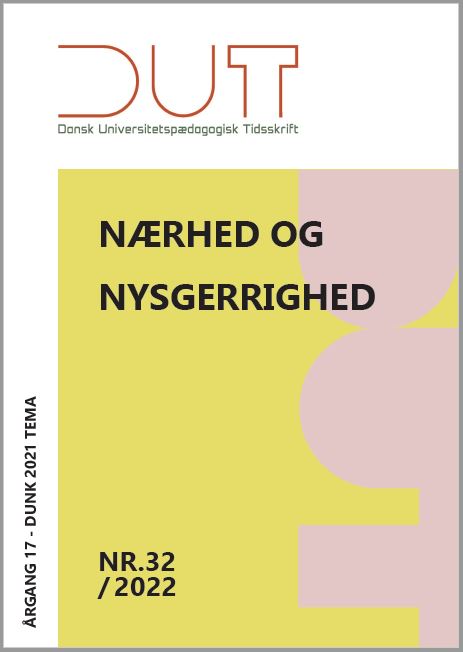DUT Guide: Inclusive online teaching and learning: Examples from HE teachers during the COVID-19 lockdown
DOI:
https://doi.org/10.7146/dut.v17i32.130152Resumé
During the COVID 19 lockdown, higher education (HE) teachers and students had to adapt to working, interacting and learning in digital spaces. This guide provides examples of HE teachers’ inclusive and effective online teaching and learning practices during the lockdown. The examples include curricular, pedagogic, organisational, relational and affective approaches, all of which were implemented by teachers intent on providing inclusive and effective learning opportunities for their students. This selection of examples is offered to HE teachers seeking inspiration for the development of their own inclusive and effective online teaching and learning.
Referencer
Brame, C.J. & Biel, R. (2015). Setting up and facilitating group work: Using cooperative learning groups effectively. Vanderbilt University Center for Teaching. http://cft.vanderbilt.edu/guides-sub-pages/setting-up-and-facilitating-group-work-using-cooperative-learning-groups-effectively/.
Bakar, F. & Kumar, V. (2019). The use of humour in teaching and learning in higher education classrooms: Lecturers' perspectives. Journal of English for Academic Purposes, 40, 15-25. https://doi.org/10.1016/j.jeap.2019.04.006
Bolliger D.U. & Armier D.D. (2013). Active learning in the online environment: The integration of student generated audio files. Active Learning in Higher Education. 14(3), 201-211. https://doi.org/10.1177/1469787413498032
Broom, D. (2020, April 22). Coronavirus has exposed the digital divide like never before. World Economic Forum. https://www.weforum.org/agenda/2020/04/coronavirus-covid-19-pandemic-digital-divide-internet-data-broadband-mobbile/.
Burgstahler, S. (2021). Universal Design in Education: Principles and Applications, Disabilities, Opportunities, Internetworking, and Technology. https://www.washington.edu/doit/universal-design-education-principles-and-applications.
Costelloe, L. & Reale, J. (2021). No Walls, No Limits? Universal Design for Learning in the new landscape of Higher Education in Keane, M., McAvinia, C. & O'Sullivan, I., (ed)., Emerging Issues IV: Changing Times, Changing Context, EDIN, https://www.edin.ie/?page_id=537.
Dallimore, E. J., Hertenstein, J. H. & Platt, M. B. (2004). Classroom participation and discussion effectiveness: student-generated strategies. Communication Education, 53(1), 103-115. https://doi.org/10.1080/0363452032000135805
Easton, S. (2003). Clarifying the Instructor's Role in Online Distance Learning, Communication Education, 52(2), 87-105. https://doi.org/10.1080/03634520302470
Georgsen, M. (red.), Qvortrup, A. (red.), Gundersen, P. B. & Jørnø, R. L. V. (2021). Erfaringer og oplevelser med online undervisning på 9 videregående ud-dannelsesinstitutioner i foråret 2020. https://www.ucn.dk/Files/Billeder/ucn/Forskning/COVID%2019%20undervisning%20samlet%20rapport.pdf.
Gilbert, T., Doolan, M., Beka, S., Spencer, N., Crotta, M. & Davari, S. (2018). Compassion on university degree programmes at a UK university The neuroscience of effective group work. Journal of Research in Innovative Teaching & Learning, 11(1), 4-21. https://doi.org/10.1108/JRIT-09-2017-0020
Godsk, M., Kristiansen, B. & Møller, K.L. (2021). Digital læringsteknologis potentiale for studerendes engagement. Pædagogisk Indblik Nr 12, https://dpu.au.dk/fileadmin/edu/Paedagogisk_Indblik/Digital_laeringsteknolgi_studerendes_engagement/12_-_Digital_laeringsteknologis_potentiale_for_studerendes_engagement_-_23-06-2021.pdf.
Harden, R. M. & Laidlaw, J. M. (2013). Be FAIR to students: four principles that lead to more effective learning. Medical Teacher, 35(1), 27-31. https://doi.org/10.3109/0142159X.2012.732717
Harris, B.N., McCarthy, P.C.,Wright, A.W., Schutz, H., Boersma, K.S., Shepherd, S.L., Manning, L.A., Malisch, JL. & Ellington, R.M. (2020). From panic to pedagogy: Using online active learning to promote inclusive instruction in ecology and evolutionary biology courses and beyond. Academic Practice in Ecology and Evolution, 10, 12581-12612. https://doi.org/10.1002/ece3.6915
Hockings, C. (2010). Inclusive teaching and learning in higher education: a synthesis of research. https://www.advance-he.ac.uk/knowledge-hub/inclusive-learning-and-teaching-higher-education-synthesis research.
Hodges, C.B. & Fowler, D.J. (2020). The COVID-19 Crisis and Faculty Members in Higher Education: From Emergency Remote Teaching to BetterTeaching through Reflection. International Journal of Multidisciplinary Perspectives in Higher Education, 5(1), 118-122. https://doi.org/10.32674/jimphe.v5i1.2507
Killick, D. & Foster, M. (2021). Learner relationships in global higher education. A critical pedagogy for a multicultural world. London: Routledge. https://doi.org/10.4324/9780429294877
Kugel, P. (1993). How Professors Develop as Teachers. Studies in Higher Education, 18 (3), 315-328. https://doi.org/10.1080/03075079312331382241
Merry, K. (2021, April 14). Universal Design for Learning: an antidote to digital poverty, AdvanceHE, https://www.advance-he.ac.uk/news-and-views/universal-design-learning-antidote-digital-poverty.
Persky, A. & Pollack, G. (2010). Transforming a large-class lecture course to a smaller-group interactive course. American Journal of Pharmaceutical Education, 74(9), 1-6. https://doi.org/10.5688/aj7409170
Rose, D. (2001). Universal Design for Learning. Journal of Special Education Technology, 16(2), 66-67. https://doi.org/10.1177/016264340101600208
Ryan, R.M. & Deci E.L. (2000). Self determination theory and the facilitation of intrinsic motivation, social devlopment and well-being. American Psychologist, 55(1), 68-78. https://doi.org/10.1037/0003-066X.55.1.68
Schatz, M.A. & LoSchiavo, F.M. (2006). Bringing Life to Online Instruction with Humor. Radical Pedagogy. https://radicalpedagogy.icaap.org/content/issue8_2/shatz.html.
Tarc, P. (2020). Education post- 'Covid-19': Re-visioning the face-to-face classroom. Current Issues in Current Issues in Comparative Education, 22(1), 121-124.
Downloads
Publiceret
Citation/Eksport
Nummer
Sektion
Licens
DUT udkommer elektronisk via Statsbibliotekets Open Journal System (Tidsskrift.dk) og DUNs hjemmeside (DUN-net.dk) forår og efterår. Det er gratis og frit tilgængeligt at læse og downloade artikler fra tidsskriftet.
Det er ikke muligt at abonnere på Dansk Universitetspædagogisk Tidsskrift, DUT, men hvis du er medlem af DUN, får du tilsendt en nyhedsmail med link til udgivelsen, når den nyeste udgave er online. Linket vil også være tilgængeligt her på siden, så snart tidsskriftet er publiceret.
© Copyright
Artikler publiseret i Dansk Universitetspædagogisk Tidsskrift, DUT, må bruges (downloades) og genbruges (distribueres, kopieres, citeres) til ikke-kommercielle formål med reference til forfattere og Dansk Universitetspædagogisk Tidsskrift.
Artikler indsendt til Dansk Universitetspædagogisk Tidsskrift må ikke publiseres i andre tidskrifter.
Betingelser
Artikler i Dansk Universitetspædagogisk Tidsskrift, DUT, er omfattet af ophavsretsloven, og der må citeres fra dem.
Følgende betingelser skal dog være opfyldt:
- Citatet skal være i overensstemmelse med „god skik“
- Der må kun citeres „i det omfang, som betinges af formålet“
- Ophavsmanden til teksten skal krediteres, og kilden skal angives ift. ovenstående bibliografiske oplysninger.





